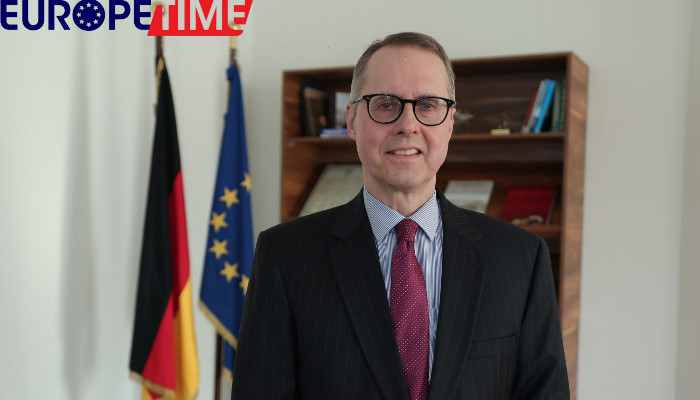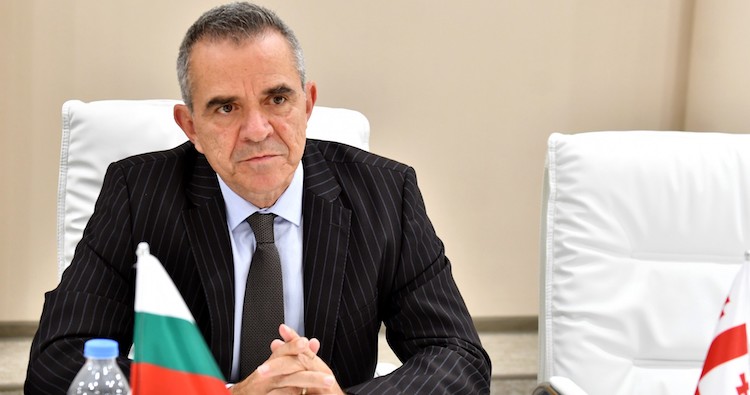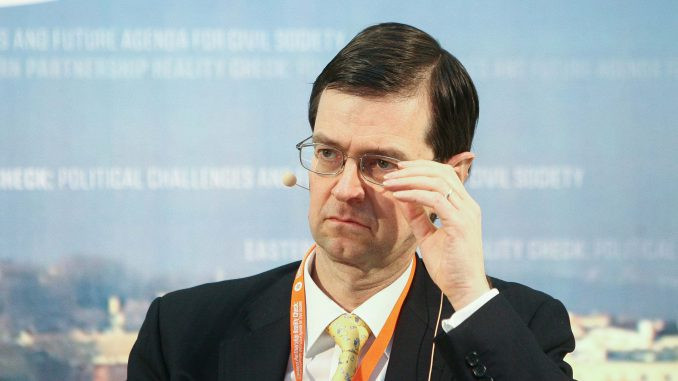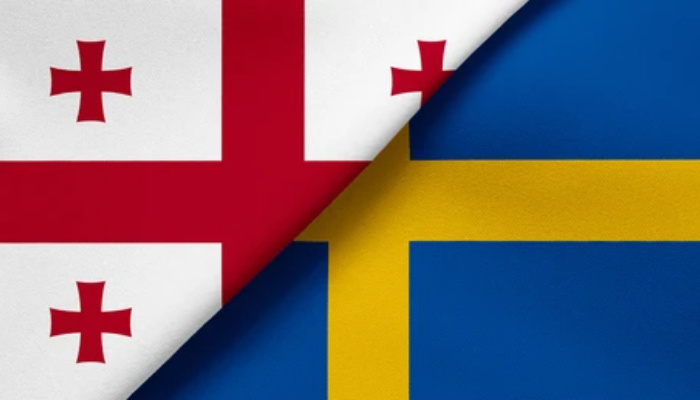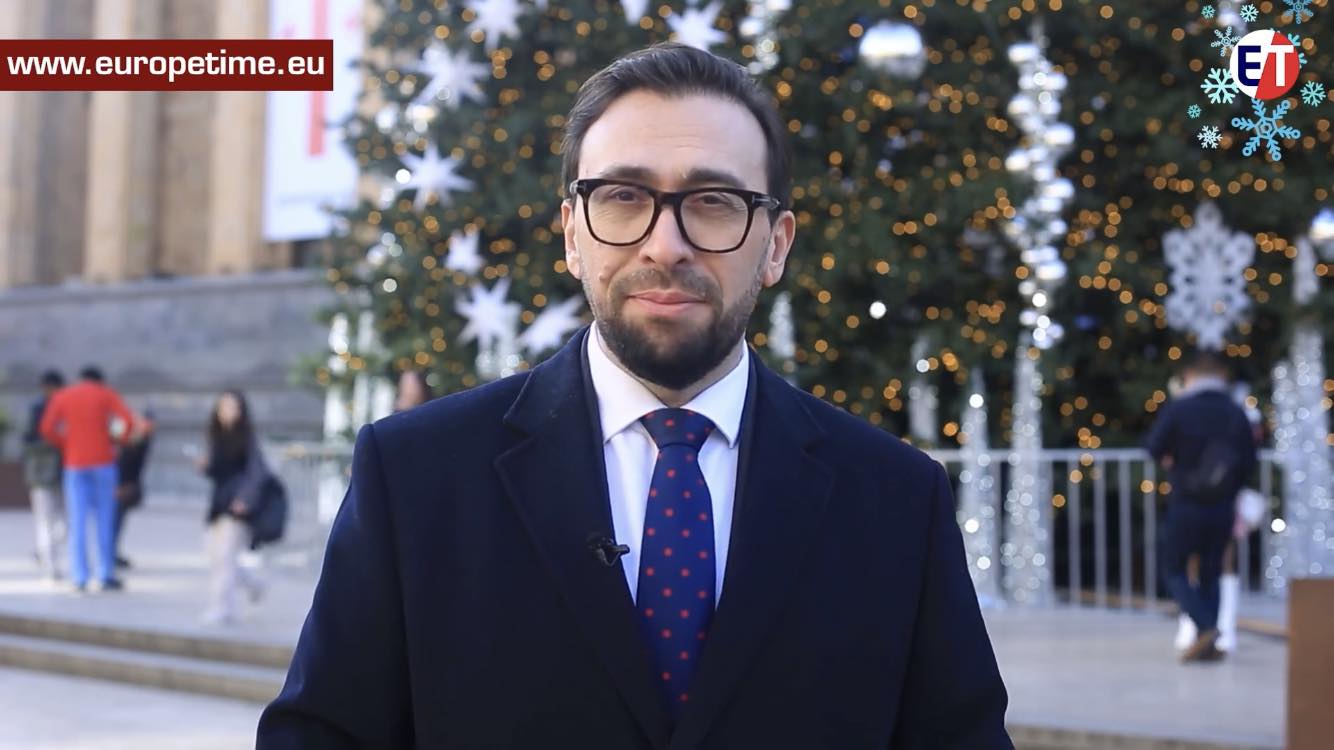- The German Ambassador to Georgia, Peter Fischer, discusses a variety of current issues in an exclusive interview with Europetime.
ET: Mr. Ambassador, the political dialogue between Germany and Georgia deepened further when the foreign ministries of Georgia, Germany, and France launched trilateral consultations in 2018. Germany has vowed to become a guarantor of European security. France also wants new security guarantees to be extended to Georgia as well. What more could you share with us about defense and security cooperation between Germany and Georgia?
We have a very strong security and defense cooperation with Georgia. First of all, Germany is a part of NATO and NATO has a strong relationship with Georgia. Then, there`s the substantial NATO-Georgia package.
The goal is to bring Georgia to NATO’s standard and for NATO to cooperate in all areas of defense and military with Georgia to align the standard of Georgia’s defense. And, there`s a core team whose leader is a German Colonel. Germany takes the lead in three deferent initiatives under the framework of NATO-Georgia cooperation. One is Engineering, the second is the building of Defense institutions, and the third is Military Medicine. Of course, we have exercises where Georgia cooperates with NATO and Germany participates. And, on the bilateral level, we also have a long-standing history of good cooperation.
For example, Germany helped to set up the Georgian non-commissioned officers school. We run an annual bilateral cooperation program where we exchange expertise on various military matters. We have training programs involving many senior Georgian military officers and junior ranking Georgian officers have participated in some kind of specialist training in Germany. We also have a strong cooperation in terms of equipment. Germany delivers some quite substantial military equipment to Georgia.
ET: Does defense cooperation have special importance right now?
Yes. Russian attack on Ukraine made the whole world realize that Russia is willing to use its military force to fulfill its objectives. These objectives are criminal under international law and they are not acceptable. So, everyone who is in favor of defending international law, and who is in favor of settling our international affairs via negotiations, agreements, and on the basis of law rather than by force, attack and other illegal means, realizes how important it is to make clear to Russia that we do not accept military aggression. We do not accept changing borders by force.
ET: NATO has increased its support for Georgia in light of the conflict started by Russia in Ukraine and the threats. What is Germany’s stance on this matter?
We are a member of NATO. So, any decision that NATO takes, we support. NATO is above all a self-defense organization with a mutually assured defense and, we try to cooperate and strengthen with partners who are relevant for our security. And that`s the case in Georgia so, we support that.
ET: Around 50 agreements are in force between Georgia and Germany encompassing areas such as promotion and reciprocal protection of investments. What are the sectors where Germany is most interested?
We are interested in all our agreements and that`s why we made them. Let me highlight two areas. Most of our agreements are probably in the field of development cooperation, where Germany supports Georgia to develop certain parts of its economy and society. The most important areas of this cooperation are vocational training, raising the skills of Georgian people in various professions, renewable energy development, energy efficiency and energy market reform. And the third is sustainable Urban development where we have a big program with a budget of almost €50 million for Tbilisi and Batumi.
That`s the development cooperation side and each of those programs comes with an agreement. But I would like to also mention that in September 2022 the two foreign Ministers signed a cultural agreement that fixes the status of German institutions here like other good institutes. Then, we also have the German academic exchange service that facilitates cooperation between universities, and the exchange of students and professors between Germany and Georgia.
This also outlines our youth and sports cooperation and in terms of culture, it is promoting Georgians learning German, and perhaps some Germans learning Georgian. We have our young people going back and forth studying and learning about each other`s culture, and not just about business, not just defense, but the culture, the lifestyle, which are very important, especially in the framework of Georgia moving closer to the European Union. That`s an excellent preparation for both of us - you learn about us as you`re moving toward us, and we learn about you as you move towards us.
ET: How would you evaluate the pace of Georgia's progress on the path towards European and Euro-Atlantic integration?
I would rate it as very good. If you view this from a broader perspective, since Georgia’s independence in 1991 and her first diplomatic relations with foreign countries in 1992—by the way, the first of these countries was Germany—the country has fundamentally changed in Georgia over time, especially in the areas of reforms passed to contribute towards Georgia’s Euro-Atlantic integration.
So, if I take that big view, I see a big progress. I see the direction; I see the will of Georgians. I have never met a single Georgian that said I don`t want Euro-Atlantic integration. Maybe there`s some of them somewhere but I have not met them yet. So it`s happening, with NATO and it`s happening with the European Union.
ET: Georgia is in the process of putting 12 European Commission recommendations into practice. What expectations does Germany have about these recommendations?
We have the expectation that there will be significant progress in implementing these 12 recommendations that were given to Georgia by the European Union. 2023 is a giant opportunity for Georgia to achieve candidate status and it presents a giant opportunity for us too.
2023 can be the year when Georgia achieves candidate status for the European Union. Being a part of the European Union is an enormous historic opportunity for Germany; it has been the greatest luck and the biggest blessing for Germany to be a part of the European union.
European Union membership is the basis of our stability, our peace, our prosperity. In fact, all the subsequent enlargements of the European Union have brought stability, peace, and prosperity to the new member states. We want the same thing to happen with Georgia. Georgia wants to join us. The opportunity is there. Countries that want to join should share goals and values with the European Union.
At the heart of the 12 recommendations is the opportunity to show that you share those goals and values, and the fundamental goal that is central to all of us is to be a sustainable pluralistic democracy.
So a democracy that is strong and pluralistic means that all sectors of society, and every individual will enjoy rights and can exercise those rights from participating in democracy and being a part of a democratic society. So, showing significant progress in implementing the 12 recommendations shows that Georgia shares the goals and values of European Union, and that`s why we want Georgia to be a member because we can tell that we are like-minded clubs with similar goals and values.
Rule of law is fundamental. Separation of power is fundamental. One of the recommendations is also an independent judiciary system. Another one is “De-oligarchization”, where there is no undue influence on various sectors of the country by individuals.
Another one is depolarization. To become a sustainable pluralistic democracy requires a consensus that is central to society’s main goals. If a country is too polarized, it is a risk to democracy. And this is something that we have observed about Georgia.
Unfortunately, we observe it in many countries of the world nowadays where people can`t agree on anything; they can`t even agree on the facts. Everything is disputed in a zero sum way and that`s not healthy for any democracy. We are hopeful that what we are observing about Georgia is direct progress.
ET: The German Chancellor Olaf Scholz, made a point of highlighting the value of the European Union to countries that aspire to join the European Union in matters of solidarity with Ukraine. Although he made no mention of Georgia, he implied that the candidate nations should abide by the EU's visa and sanctions policies. How would you rate Georgia's further efforts in this area?
The German Chancellor did make mention of Georgia in an important speech he gave last year. He mentioned in English that from the North Sea to Tbilisi, Europe needs to come together and meet the challenges of the future together.
So, he has in a kind of symbolic way mentioned Georgia, and of course last year, he held a meeting with the Georgian Prime Minister and so on. On the sanctions, the European Union agrees on the sanctions as they emanate from the European Union. We don`t require other countries to adopt those sanctions by law, Georgia has not. Of course sanctions are more effective when the more people are working in the same direction.
So, it`s up to Georgia to determine the sanctions that Georgia wants to adopt or not. What we do is to ask our friends, and what we hope for in our friends is that they don`t become a place where sanctions are circumvented.
Georgia has promised that and to a large extent, I think Georgia is doing a reasonable job of not being a place for people to evade sanctions. But we also monitor this very closely because of course, if we are talking about Russian sanctions, Russia and other countries that are sanctioned will try everything to evade and to find another route for the activities that are sanctioned.
ET: Do you see the problems in this regard in Georgia?
I would say in General; I do not see very big challenges with Georgia. I think Georgia is doing a good job to prevent sanctions evasion.
ET: The list of criteria to be fulfilled by Georgia will probably increase if it receives candidate status.
Yes, because the closer you get to the EU, and once you become a candidate, then you`re negotiating with the EU on many details surrounding your membership. Like I said, the most principal point is that you accept the goals and values but we also look at its alignment with European policies which is common practice in foreign and security policy, so it is hard to say right now if the criteria will increase.
Let`s take a completely different example – I would like to be a part of the European Union but I can`t accept economic sanctions against North Korea because I have such strong relations with North Korea. Maintaining such stance will make it quite hard for me to join the European Union.
ET: The Black Sea undersea cable project will get €2.3 billion from the European Union. As a representative of the country with the largest economy, what is your opinion about the significance of this project for Georgia and the Black Sea?
I think it`s very important, and I think it`s very symbolic of the big strategic economic opportunity that Georgia has. And that opportunity will help us to make the south Caucasus region a hub of connectivity between Europe, South Caucasus, Central Asia and East Asia. The opportunity is available especially now, and we call it middle corridor connection between East Asia and Europe rather than the northern Corridor which goes through Russia.
If Russia takes itself out of the equation by its own volition, that`s an opportunity for this region. But even if Russia stays on and maintains international economic connections, this region has a unique opportunity before us because, it is the shortest route and the Black Sea cable project shows that it is not just about transport.
Transport is one thing but other businesses services surrounds the logistic connection and the Black Sea cable is a win-win because we need green electricity and the South Caucasus region (Georgia and its neighbors) have the potential to produce quite a bit of it. So, you can produce renewable electricity from renewable sources and send it to us.
We will buy it from you and send it to us via the Black Sea cable. It is a highly symbolic project because it presents a big opportunity to Georgia and the entire region as Georgia draws closer to the actualization of its EU aspirations.
ET: The Anaklia Port issue has recently gained attention. The potential for investment in business from other nations has been discussed extensively. Some actors hinted at the prospect of German corporations investing alongside the American ones. How do you see this perspective, and how does Germany feel about the perspective and importance of implementing this project?
Anaklia Deep Water Port project is very important in the same connection that I mentioned before. There is potential for Georgia to be a hub of connectivity between Europe, South Caucasus, Central Asia and East Asia with important transport and trade routes for businesses associated with it. And of course, much of that starts with ports. Ports on the Black Sea, Ports on the Kaspian and the logistics connections in between.
I am not familiar with any particular German company but of course we do have good companies that are involved in ports logistics. Some people say Germany is the world champion of logistics. So, the more this strategic development takes place, the more German companies will be interested to come here, invest here and create jobs. If Georgia becomes the connection point or hub of connectivity, that development will lead to the creation of jobs, value addition, investment, and profit.
ET: The Russian-led conflict in Ukraine has highlighted the significance of energy security. What are the general risks that nations should think about, based on your experience in the energy sector?
So, with energy we speak about triangle of needs. One is reliability, and we have to make sure that we have energy, we have electricity and power for heating, for cooling, for powering our factories, our cars, and all that security. Then it has to be economical. We want it for the best possible price because we need to be able to afford it. If it`s available but we can`t pay for it, it won`t help us. Thirdly, it has to be sustainable i.e., it has to be environment friendly, and it has to be compatible with climate.
So first thing, I would say and this is a fundamental thing, is the sustainability part. We`re going to change from fossil based fuels to renewables. We must not forget that it remains the fundamental challenge. In Germany, we created an energy relationship with Russia since the 1970s, and before the Russian attack on Ukraine, we imported a large share of our oil and gas from Russia.
Some countries warned us that we were making ourselves vulnerable to Russia. They hinted that Russia will use these exports as a political weapon and we always said first of all we`re not completely dependent because we have other sources. We have other sources which covers a large share, but buying from Russia is economical for us and, it`s a source of stability with Russia because we have a relationship. We need each other, they need us as a buyer and we need them as a seller.
Germany did make a mistake, that we`ve failed to understand. Let`s say, Putin`s reasoning was not the same, he said I have some other goals and those goals are even more important to me than stability of the relationship with Germany or the West. We were the biggest buyer of Russian oil and gas and Putin threw that away for the sake of controlling Ukraine.
We said if you attack Ukraine then, you can`t have this energy relationship with us and he said I don`t care, I will attack Ukraine. His prioritization to attack Ukraine is so much important to him, and that`s what we fail to understand. We assumed that he will be reasonable and not do something very unreasonable but his reasoning is different from ours.
So, we learned from that and the lesson is for us to encourage diversification of sources and try to find as many sources in countries that are friendly. We say by and large other democracies that we call our value partners, with similar democratic political systems as ours in Germany. Democracies are less likely to be completely unreasonable. So, we are now importing zero gas from Russia where the trend on oil is clearly down and we, Germany had to scramble everywhere in the world to find replacements.
We built LNG (Liquefied Natural Gas) terminals which we have opened up in a record time and we have value partners that are available in countries like Norway, Canada, USA, and many other sources around the world.
So, we always think of the triangle between security of supply which we are tackling by diversifying and having countries that are our value partners as suppliers. In terms of economics, we try to find cheapest sources.
Right now, we`re paying for our mistakes with Russia by having to buy much more expensive energy resources, so the electricity bill in Germany has gone up quite a bit for our citizens. The third and most fundamental is sustainability.
We want to address climate challenges; kick off fossils all together; and fully embrace renewable energy. Almost every country can pursue renewable energy on their own at home but, international cooperation is also important because the renewable energy market is a big market. It is a big electricity market and if you can do it, you should try as much as possible to do it with your value partners who are friendly, democratic, and are unlikely to use energy as a political weapon against you.


